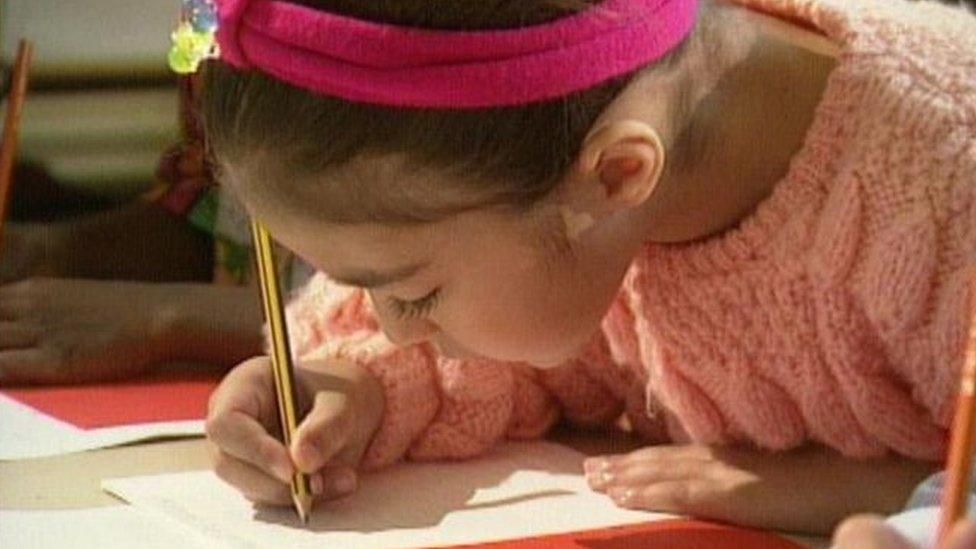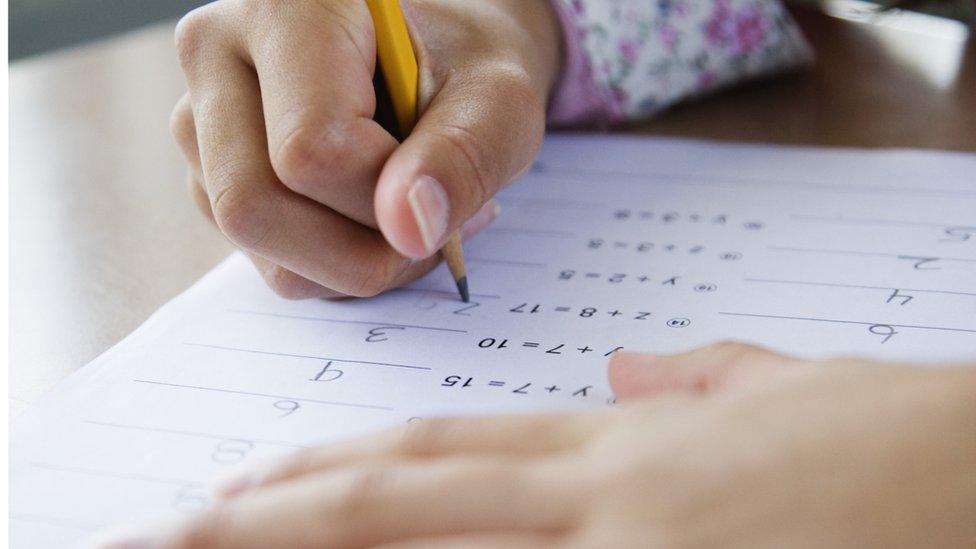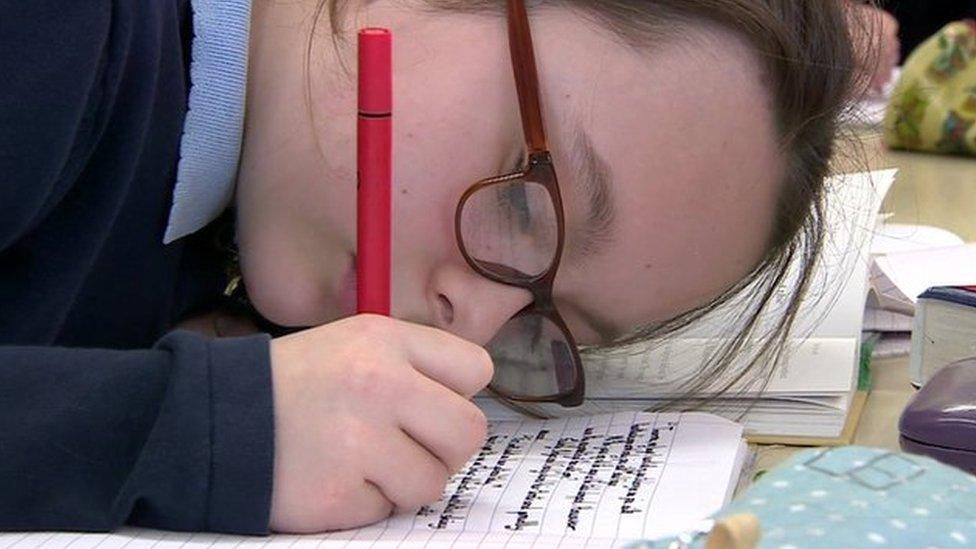Primary tests: What are the changes?
- Published

Year 6 pupils across England are sitting new, more rigorous, national curriculum tests, known as Sats. The BBC News website answers some of the key questions about changes to - and complications with - the tests this year.
What are the changes to national curriculum tests (Sats) this year?
Children in Year 2 (aged 6-7) and Year 6 (aged 10 and 11) are the first cohort to take new, more rigorous Sats tests this summer term.
Children will still sit tests in reading, maths and spelling, punctuation and grammar. But the tests are more demanding than previous years, with more expected of pupils.
Up until last year, Sats tests were graded on levels - for example Level 4 was the expected level for children finishing primary school. But these national curriculum levels have now been scrapped.
Instead parents will be given their child's raw score (the actual number of marks they get) and whether they have reached the national average.
Year 6 Sats are largely marked externally, while Year 2 Sats will still be marked by teachers at the school. Children who do not reach the expected level in their Key Stage 2 tests at the of primary will be expected to re-sit tests when they go on to secondary school.
When are the Sats tests this year?
Tests for Year 6 (Key Stage 2) pupils are taking place between Monday 9 May and Friday 13 May this year.
Tests for Year 2 (Key Stage 1) pupils are taking place during the month of May, at a time chosen by the school.
Hasn't there been a problem with a published paper?
Yes. It emerged in the early hours of Tuesday, on the morning it was due to be taken by 600,000 children, that a spelling, punctuation and grammar (SPAG) test had been published online.
The Sats answers appeared for four hours on a password-protected website.
The Department for Education blamed a "rogue marker" and put the leak down to an "active campaign by those people opposed to our reforms to undermine these tests" and says Tuesday's tests will go ahead as planned.
It also emerged at the end of last month that a spelling and grammar test for Year 2 pupils had been accidentally put online by officials and the government was forced to scrap it.
Half a million seven-year-olds in England had been due to take the test.
How are children prepared for Sats?
Many schools run booster classes in the run-up to Sats, particularly for Year 6 children, to bolster pupils' chances of doing well. Some parents have their children privately tutored.
The stakes are high for schools, as the data from the Year 2 and 6 Sats tests is used to publish school "league tables", which rank primary schools on performance.
Critics of the tests, which were brought in 25 years ago to regulate educational standards, say this pressure on schools means pupils are taught to the test in their final year of primary school.
How are pupils helped to cope with the pressure?
Some schools offer pre-Sats breakfasts in an attempt to raise children's morale - and also to make sure they aren't hungry!
Others write letters to pupils explaining that the tests are not the be all and end all of their school career. Earlier this week, an inspiring letter sent out to pupils by several schools went viral.
Aren't there tests for Reception children now as well?
Yes and no. Tests for Reception pupils are known as "baseline tests". They cover reading, writing and maths and are carried out when pupils start school. The government had intended to use these tests to assess primary schools' performance.
Schools could have opted to use them in September 2015 for the current Reception cohort. The tests were to be rolled out across all schools in September 2016 - but they have been postponed.
In April, ministers abandoned the tests after a study showed the papers - which are offered by three different providers - could not be reliably compared. Ministers admitted using them to measure primaries would be "inappropriate and unfair".
With regard to these tests, critics had always maintained that testing four-year-olds is too much, too soon.
Why have primary tests changed?
Primary tests have changed in line with a new curriculum brought into England's schools by the Department for Education (DfE) in September 2014.
The new curriculum covers primary school pupils, aged five to 11, as well as secondary school pupils up to the age of 14.
When did we first know Sats were changing?
We first knew about the changes two years ago, when the new curriculum was announced in March 2014, by the then Education Secretary Michael Gove.
Parents can be forgiven for not remembering all this new information in a seemingly ever-changing landscape of education reform.
The DfE has given schools further information on the changes to help them adapt their approach and assessment arrangements, including sample papers, external.
Why were all these changes brought in?
The government says all children must leave primary school with a good standard of reading, writing and maths.
The DfE's website says "previous expectations for children were too low". It says the new assessment system has been designed to reflect the "new, more challenging national curriculum".
Does everyone agree with the tests?
No. Critics say all these tests for primary-age children are an unnecessary burden.
In the week before this year's round of primary tests, some parents took their children out of school for the day in protest at the pressure being put on children.
But those in favour of testing say it holds schools to account - and that can only be good news for pupils and parents.
What happens in primary schools elsewhere in the UK?
There are no Sats in Scotland. However, Scotland's First Minister announced in August 2015 that new national, standardised assessments will be introduced for pupils in P1 (equivalent to Reception in England and Wales), P4 (Year 3) and P7 (Year 6). The new assessments will start in 2017, after being piloted in 2016, and will focus on literacy and numeracy.
In Wales, statutory teacher assessments take place at the end of Key Stage 2 (Year 6), but pupils do not take Sats. From May 2013, all children in Wales from Years 2 to 9 have taken national reading and numeracy tests as part to a new national literacy and numeracy framework.
Pupils in Northern Ireland are given computer-based assessments in numeracy and literacy - or InCAS tests - in Years 4 to 7 (equivalent to Years 3 to 6 in England and Wales). Teachers give pupils levels at the end of Key Stage 1 (Year 4) and Key Stage 2 based on how they perform in the general cross-curricular skills of communication, using Mathematics and using IT.
- Published10 May 2016

- Published3 May 2016

- Published27 March 2016
